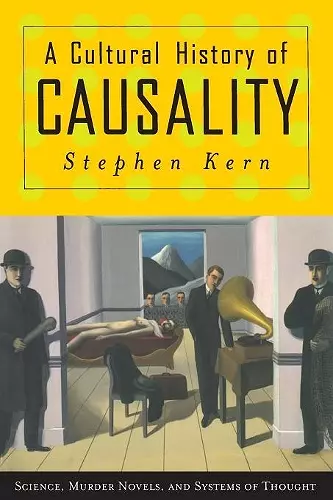A Cultural History of Causality
Science, Murder Novels, and Systems of Thought
Format:Paperback
Publisher:Princeton University Press
Published:22nd Aug '06
Currently unavailable, and unfortunately no date known when it will be back

Kern gives us in this book a brilliant history of modern causality, which he traces in fiction from the linear unities of the realist novel through the indirection and uncertainty of modernism. He hits on the ingenious device of analyzing literary treatments of murder to illuminate the changing psychiatric, social, linguistic, and biological theories of cause mirrored in the history of contemporary philosophy and science. This is a text of incomparable richness, ingenuity, and careful reasoning. -- Robert Nye, Thomas Hart and Mary Jones Horning Professor of the Humanities and Professor of History, Oregon State University Whether one is interested in causality or in culture, or in the history of their relationships, this is an essential book. -- Arkady Plotnitsky, Professor of English and Director of Theory and Cultural Studies, Purdue University Historians of late have been returning to the scene of the crime. And if murder is where bodies and histories cross, then there is no better place than the scene of the crime to take the temperature of modernity. Stephen Kern's richly informed investigation of causality's strange history shows why. -- Mark Seltzer, author of "Serial Killers: Death and Life in America's Wound Culture and True Crime" Like his earlier book, The Culture of Time and Space, this is a work of daunting intellect that moves fearlessly between literary and scientific achievements in its exploration of human thought. In analyzing famous fictional murders, Kern has written a book that flows like a detective story. While it operates at the highest intellectual level, it is also a pleasure to read.. -- Laura Otis, Professor of English, Hofstra University, author of "Membranes: Metaphors of Invasion in Nineteenth-Century Literature, Science, and Politics" This book represents a most successful endeavor to write a history of the 'causal' since 1830, one that will certainly take pride of place not only in the literature on crime but also in the modern historiographic literature on how arguments are made and how they are validated over time. -- Sander L. Gilman, author of "Making the Body Beautiful"
Traces how our understanding of the causes of human behavior has changed radically over the course of European and American cultural history since 1830. This work examines the causal factors or motives for murder - ancestry, childhood, language, sexuality, emotion, mind, society, and ideology.This pioneering work is the first to trace how our understanding of the causes of human behavior has changed radically over the course of European and American cultural history since 1830. Focusing on the act of murder, as documented vividly by more than a hundred novels including Crime and Punishment, An American Tragedy, The Trial, and Lolita, Stephen Kern devotes each chapter of A Cultural History of Causality to examining a specific causal factor or motive for murder--ancestry, childhood, language, sexuality, emotion, mind, society, and ideology. In addition to drawing on particular novels, each chapter considers the sciences (genetics, endocrinology, physiology, neuroscience) and systems of thought (psychoanalysis, linguistics, sociology, forensic psychiatry, and existential philosophy) most germane to each causal factor or motive. Kern identifies five shifts in thinking about causality, shifts toward increasing specificity, multiplicity, complexity, probability, and uncertainty. He argues that the more researchers learned about the causes of human behavior, the more they realized how much more there was to know and how little they knew about what they thought they knew. The book closes by considering the revolutionary impact of quantum theory, which, though it influenced novelists only marginally, shattered the model of causal understanding that had dominated Western thought since the seventeenth century. Others have addressed changing ideas about causality in specific areas, but no one has tackled a broad cultural history of this concept as does Stephen Kern in this engagingly written and lucidly argued book.
"[An] ambitious book... [Kern's] focus on murder keeps things pleasantly lurid, and his erudition and passion shine through on every page."--Publishers Weekly "Thoughtful and carefully done, the fruit of considerable research."--Richard A. Posner, Science "Kern has mastered the novels, the critical literature, and the works by philosophers and sociologists bearing on his thesis... [R]eaders familiar with the novels will see them in a new light."--Jonathan Beard, Scientific American "As a history of science and ideas, Kern's study succeeds brilliantly. Gathering the disparate knowledge systems of nearly two centuries into discrete categories, Kern produces a taxonomy of causality that is cogent and convincing... From Enlightenment positivism to quantum discontinuity; from religion to existentialism, and phrenology to cybernetics; from Freud to Nietzsche to Foucault, and from Darwin to Durkheim to Derrida: Kern ranges comfortably (and profitably) among them all. Specialists and novice alike will find much hereto learn and admire."--Peter Okun, American Historical Review "Murder stories, Kern argues, are a sort of cultural repository of thoughts about causality, of how things fit together. From the pseudo-scientific deductions of Conan Doyle to the postmodern self-reflections of Don DeLillo, Philip Kerr and Robert Coover, detective stories demonstrate how we cope with the biggest contingency of all: conscious killing."--Mark Kingwell, The Globe and Mail "Causality, Stephen Kern concedes, is hard to define and even harder to prove... [T]his book is highly recommended to everyone interested in smart and engaging interdisciplinary scholarship."--Peter Okun, American Historical Review "[An] impressive study of causality... Kern offers some fascinating insights into the relationship between science and literature, as well as the history of our attempts to explain the why and wherefore."--PD Smith, The Guardian
ISBN: 9780691127682
Dimensions: unknown
Weight: 680g
448 pages